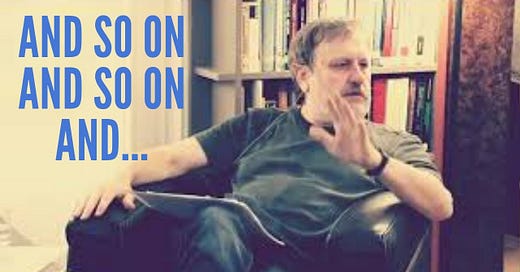Hypothesis
…
What if we’re the ones who believe?
False Faith?
Medieval Europe was very strange. Six, seven hundred years ago, well… that Europe is altogether alien from the one we know today. Was it Christian? Sure. After a fashion. Not in any way that you or I living today would recognize but, you know, they had the liturgy. They had the sacraments. There were churches. And people prayed to Jesus.
We’re the weirdos. We’re the children of The Puritans. America, with its profound influence on the rest of world culture, has colored our opinions about what Christianity means and so, for better or worse, on the astral plane all our souls are wearing buckles on their hats. They walk around with built-in radical protestant assumptions. Default New England worldviews.
Even the Catholics.
Even those in Europe, Africa, or Central America.
John Bunyan’s shadow is large.
If you or I had a time machine, and if we could go back ten or so centuries to Medieval Europe and assess the faith of that place a thousand years ago… I suspect we’d be quite scandalized by what we found.
For starters, Medieval Europe was strikingly materialistic. So much so that it makes us today look like downright ascetics by comparison. Indeed, at times it seems as if the entirety of medieval culture was centered around proving yourself better than your neighbors, explicitly, and even boorishly, through the upstaging of him or her by your home, furniture, and clothing. This was the era of pointy shoes and bells laced on your belt. Fur lined bonnets and tam o’ shanters. Gilded waistcoats. Leggings. Bonnets and buckles and blouses. Men and women all sparkling with jewelry. Indeed, so fierce did the Fashion Wars rage through Medieval Catholicism that there had to be actual laws passed regulating who could and who couldn’t wear what.
You know…
Depending on their station.
Nobles, for example, were allowed a wide color palette in their clothing, and more luxury of embroidery. Bright blues were illegal for the peasantry. Blood reds quite questionable. The clergy, likewise, were on paper allowed certain finery not available to their flocks. The “on paper” part is important. Like so much of medieval society, these laws were often dependent on how much money you had and, in practice, what one could or couldn’t wear tended to come down more to how high your income was than it did to your bloodline or occupation. Wealthy peasants for example (Triple Paren Aside: There were more of these than you might imagine. The Poop Guild (Yes that was real, no plumbing and so there was a guild of workers (the European equivalent of Indian Untouchables) tasked with collecting everyone’s buckets of waste each morning in the cities) for example grew unimaginably wealthy after the invention of firearms because one of the ingredients of gunpowder is saltpeter, which can be extracted from feces through the use of urine) could get away with clothing that might get them mistaken for lords or ladies and the poorer nobility, while legally allowed all the finery they would like… might simply have been unable to afford it. In England the tying of status to money became very explicit, to the point that sumptuary laws stated outright that a peasant who had an income of 2X was allowed to dress the same as a knight with an income of X. Nobility was for purchase.
Perhaps it’s always been.
Additionally, the ease and freedom with which prostitutes could ply their trade in medieval cities would be somewhat shocking. “Sex Work” has made a comeback in recent years but, even today, most elected officials, even those who support it, would shy away a photo-op with whores. Medieval times were different. The local brothel headmistress was always sworn-in to her duties by the mayor. Whoring was a government position. Sort of like being on the school board.
Yes. Sure. There was some slight unease about the whole “fornication” and “adultery” thing happening within their walls, just as decking themselves out in gold and silver caused some unease about the Christian command to be humble. On the whole though, prostitution (like war and banking) was viewed as a necessary evil. Men, it was thought, were unable to control themselves and so, in order to prevent them from harassing virtuous (read: wealthy) women, and outlet for their frustrations had to be available. Aquinas even said so. It wasn’t until the advent of Lutheranism that sex work came to start being seen as de facto taboo and, in consequence, that the idea of romantic and sexual ties between spouses ought be stressed. “Family Values” as we know them today simply didn’t exist, and again, are largely a creation of the Puritan ethos. Back then, for all but the very lowest of classes, marriage was principally a legal arrangement for the rearing of children and inheritance of property. “Love” didn’t much enter into it. It wasn’t all that uncommon therefore for men and women to marry while not actually liking each other very much and, as a result, to not have the best of sex lives. Affairs were common for both sexes. Even expected. So much so that one priest in a small English town is said to have given a sermon praising the women of his village for their honesty in Confession, while chastising the men for lying. “All the men say to me, ‘Father, I’ve been faithful to my wife.’ All the wives though, confess constantly to the sin of fornication. One or many of you is lying!”

I’m not passing judgment here. I’m simply pointing out Realities. Demonstrating that “our Christian past” might not’ve been up to snuff for modern sensibilities and expectations. Most everywhere in the world, at most every time, has operated on a moral Two-Tiered System. The dogma, the religion on paper that everyone gives outward deference to on one level, and the private in practice behavior of day-to-day life on the other. The point is that outside The Bubble of Expectations that exists for those of us still caught in what remains of The Puritan Sphere, those two tiers have seldom, if ever, met and, importantly, for most of Humanity, this hasn’t been a problem. The Modern Expectation that we should “live up” to our stated values is historically alien. So much so that it might well be seen as a form of psychosis. Outside of the modern, Western world, almost nobody has ever had a problem being a hypocrite. It simply wasn’t a concern. The Papacy, for example, has been embroiled in sex scandals almost since the founding of the office. It was not until quite recently though that it was possible to view this as somehow discrediting. To think that The Church not behaving how it “should” was somehow a point of falsification. It is only in the modern day that a priest taking a mistress can cause a scandal. Only today is there a high horse to climb upon from which you can make the outlandish claim of “Actually, war is bad,” or “No, but you should actually care for the poor though…”
We’re the ones who believe it.
Pre-modern Christians didn’t.
That’s a bold claim, I know, and so far all of this is very abstract and theoretical. True. So what would you actually see then, on the ground, if you went back in time to view pre-modern Christianity? What would it look like, in practice?
We can answer that question.
Here is a written account of a ritual performed three times a year (Easter, Pentecost, and Christmas) by the abbot of the Monastery of Nogent to his lord, The Sire de Coucy:
“Mounted on a bay horse (or, according to some accounts, a palomino) with clipped tail and ears and a plow-horse’s harness, the abbot’s representative carried a whip, a seed bag of wheat, and a basket filled with 120 rissoles. These were crescent-shaped pastries made of rye flour, stuffed with minced veal and cooked in oil. A dog followed, also with clipped ears and tail, and with a rissole tied around his neck. The agent circled a stone cross at the entrance to the court three times, cracking his whip on each tour, dismounted and knelt at the lion platform, and, if each detail of equipment and performance was exactly right so far, was allowed to proceed. He then mounted the platform, kissed the lion, and deposited the rissoles plus twelve loaves of bread and three portions of wine as his homage. The Sire de Coucy took a third of the offerings, distributed the rest among the assembled bailiffs and town magistrates, and stamped the document of homage with a seal representing a mitered abbot with the feet of a goat.”
— Barbara Tuchman, “A Distant Mirror”
As you can see, very little of that is what we today would term “Christian.” There’s a cross, sure, but it serves a very perfunctory role in the whole affair and what any of this has to do with Jesus is beyond anyone’s reckoning. It is, in fact, a Pagan ceremony with Christ mashed in, no different than the syncretic religions of the Caribbean right now, where Jesus is thrown up alongside the names of other gods and spirits in Santeria or Voodoo. Importantly, this kind of thing is not a one-off. Medieval history is filled with that sort of thing. Bizarre, arcane rituals that few seemed to understand then and which not a soul understands now. If you’d asked the abbot’s representative riding in front of the dog what the meaning of the ceremony was… it’s doubtful he could have told you. It’s possible that the idea that it had or should have a meaning might even have been foreign to him. The pre-modern Christian was still pagan in his heart. Non-rational. Subject to the mercy of forces, gods, and spirits not only outside his ability to control, but perhaps even outside his ability to question. Such a man doesn’t really “believe” anything at all… does he? His religion and the consequences of it have never risen to meet his conscious, thinking mind.
True Believers
Stated plainly, my thesis here is that Modernity (and even Post-Modernity) can indeed be characterized as a Crisis of Belief, yes… but one in the opposite direction to what is usually assumed. Christianity today in The West is waning, failing, not because people don’t believe it but because they believe it too much. They’ve thought about it too hard. They’ve imbibed it. Structured it into their bones. Modern people have the historically bizarre expectation that their actions ought align with their stated beliefs… and see it as simply more honest and noble to just jettison those beliefs if they can’t get their actions to line up.
Think about it.
What kind of Christ followers colonize Mexico? What kind of Jesus Freak does a Transatlantic Slave Trade? What kind of Catholicism covers up prostitution and sex abuse? What kind of Protestantism worships commercialism and money?
Answer:
One for whom The Faith is only skin-deep.
As we speak The Western World is tearing itself apart because it tried to take Christ so seriously. Loving your neighbor as yourself is actually kind of impossible, and no civilization yet has ever been set-up in which you could really do it. I mean, you know, sell all you have and give to the poor! There is no race or ethnicity, only those who belong to Christ! Forgive your enemies! Those with power ought use it to serve those without! Love those who persecute you! Don’t judge! Your family is those who believe, not blood relations! Take up your cross! Come and die!
What happens when a civilization actually takes any of that seriously?
…
It implodes.
I don’t know what to tell you.
That’s just what happens.
People will get mad at me for this. They will say I’m misinterpreting what Jesus said or that that’s not what those verses mean and so forth and so on. And sure. Fine. Okay. We can and probably should nit-pick the precise meaning of Christ’s message and that of his apostles. Absolutely. I agree.
But directionally…
In general…
In general the Christian religions posits a lifestyle which, if attempted at scale, would shut down the economies of every government in the world, destroy all national and ethnic ties, and let a lot of people walk free for things like rape and murder.
In other words, what The West is currently doing to itself.
People actually believe it today.
We’re the faithful ones, not our forefathers.
Could it be that so called “White Guilt” is actually an attempt to wrestle with “Christian Hypocrisy”? Could it be a mass sentiment of “Hey… if we actually believed all that… most of history wouldn’t have happened.”?
Where Do We Go From Here?
Where to go from here?
Not Eastern Orthodoxy.
No offense! I love you guys!
The religion of Eastern Orthodoxy is fine, great even; however I get the sense that a lot of Western Converts are using it only as a reversion. A step backwards. Again, I’m not speaking of the religion itself but about the converts currently attracted to it, I hope that distinction is clear. To me, what I’m seeing is many in The West watching the dissolution of their culture into insanity and using Orthodoxy as a retreat. As an attempt to avoid wrestling with the deep-seated problems that got us here. Like those attracted to Traditional Catholicism before them, they are using their new religion as an attempt to paper over the issues of their hearts with kitsch, smells, bells, and iconography. To plug their ears with chanting and sing, “La-la-la, not happening! Not happening!” Certainly this isn’t the case for all converts, and God speed to those for whom it isn’t, but I’ve been around long enough to notice trends and patterns. Eastern Orthodoxy is a great religion if you’re choosing it for the right reasons. If it’s your “escape” though, if you’re running to it only because you’re running away from something else…
Well…
Then I just heavily doubt that it’s going to work out for you long term. The problems will still be there, waiting for you, well after the honeymoon phase with your new faith fades away and your book of Sayings of the Desert Fathers stops acting as a sufficient salve.

The issue is you see, the stone-cold fact of the matter, is that we are now confronting the simple fact that the words of Jesus and things like Civilization, The Economy, Social Mores, and National Security simply don’t go together.
How could they?
How would you build a banking system off the notion “Forgive us our debts?” How do you have a military based on turning the other cheek? How are rules enforced when you’re told repeatedly not to judge and to always forgive? How do you have a nationality, or for that matter, a nation, when we’re all supposed to be “One”?
…
Exactly.
And at base the issue is that Jesus was supposed to come back and he didn’t.
That’s the answer.
All of the hyper-communist, “Let’s sell all our possessions and live in a commune and nobody get married” stuff going on in The Book of Acts makes a lot of sense if, as the early Christians believed, the end of the world is right around the corner. If The Kingdom of Heaven is truly “at hand” and the Heavenly City is about to descend from the clouds and “Make all things new.”
If however, you’re trying to live a life where you’ll need to provide for your grandchildren… Maybe not so much.
That’s the tension.
That’s what has to be worked out.
Christianity is an apocalyptic religion built for an Apocalypse that never came.
Sure, it might still come in the future, even any day now. But… if you don’t believe that… if you don’t believe it enough to act on it… then you’re going to have a lot of trouble acting on all the other stuff Jesus said to do as well.
Modern, Western Christians actually do truly believe in Christ’s overall morality.
They do.
But they’ve stopped believing he’s ever coming back.
So it doesn’t make sense. It doesn’t work. It feels weird and discombobulating and makes society unstable.
Why?
Because Christ’s words simply weren’t intended to make for a better future *in this World*.
They only make sense if you’re planning on leaving it for another one.
We’re not planning on doing that. We’re trying to build civilizations and leave a better future for our kids and make America great again. We’re preparing for a future here.
Maybe that needs to be wrestled with.







what the fuck did kingsnorth like about this article
This was such an interesting read. Going to read it three more times and let it work on me. Great job ❤️